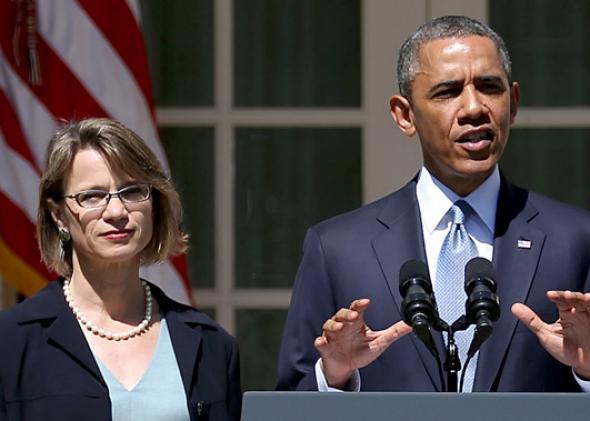Nina Pillard’s nomination to be a judge on the U.S. Court of Appeals for the District of Columbia Circuit is expected to create a showdown on Tuesday, as Sen. Harry Reid set up a confirmation vote despite concerns about a Republican filibuster. Republicans are turning up the volume of attacks, trying to paint Pillard as a radical, militant feminist. As Dahlia Lithwick argued in Slate back in July, the evidence for Pillard being a “radical” is scant, with most of the attacks focusing on her legal arguments in favor of contraception.
One quote, written by Pillard in a 2007 Georgetown University Law Center paper, keeps getting gnawed over by the right in an attempt to paint Pillard as a testicle-stealing, motherhood-hating, mythical, radical feminist: “Reproductive rights, including the rights to contraception and abortion, play a central role in freeing women from historically routine conscription into maternity.” That’s not a radical feminist agenda so much as a simple observation of the biological fact that fertile women who have sex with men get pregnant frequently if they don’t do anything to prevent it.
As reported in Mother Jones, Sen. Chuck Grassley tried to make a fuss over this quote back in September, as if it was self-evident that the American public should be offended at the idea that women might want to plan and space out births instead of all living like Michelle Duggar. Now Anna Higgins of The Hill has joined in, trying to argue that wanting motherhood to be voluntary means being opposed to motherhood itself. “To compare motherhood to ‘conscription,’ which implies mandatory, involuntary service or even slavery, is offensive,” she argues. And yes, if Pillard did that, it would be offensive! But what Pillard actually did was note that being unable to stop childbirth means involuntary motherhood, which is true.
Pillard couldn’t have been clearer in the paper in question, where she also argues, “It is reproductive rights that have begun to allow women to decide whether and when to follow the path of motherhood.” Higgins argues that support for this right is the equivalent of trying “to distance women from what she seems to view as the scourge of pregnancy.” This only makes sense if you believe that giving women the choice to say no to pregnancy means they will never say yes. Luckily, we’ve had 40 years of legal abortion and effective contraception to test Higgins’ concerns. Our schools have not turned into ghost towns. People under the age of 40—including myself, Higgins’ son, Miley Cyrus, and most of her fans—do exist. Women can say no, but they also can say yes. Pillard has two children herself, something Higgins admits. Clearly, if support for reproductive rights meant wanting to end motherhood, pro-choicers are falling down on the job.
Still, Higgins waxes poetic. “A child is an enormous responsibility and an equally enormous joy,” she writes, as if anyone were saying otherwise. Arguing that a task is joyous, however, is not and never will be a good argument for why it needs to be mandatory. Being a cat owner is a great thing, too, but it would be wrong to require every American to add one cat a year to their household for 20 years because of joy.
Anyway. Nina Pillard isn’t a radical. Her opponents are radical, evidenced by the use of Pillard’s writings as a launching pad to further the argument that birth control is inherently anti-motherhood. Nearly all women who have had sex have used contraception at some point in time. Sen. Ted Cruz can call Pillard’s pro-contraception writings “considerably outside of the mainstream” all he wants, but contraception is, in reality, so mainstream that the proper word to use for it is “universal.”
